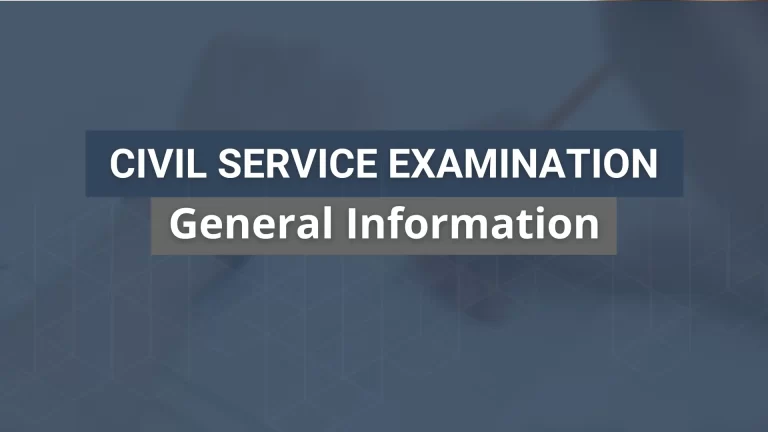This is the Multiples Choice Questions Part 7 of General Information. In preparation for the Civil Service Exam, practice, and familiarize every question we have, it might be included in the actual examination. Good luck.
Be fully prepared for your exam, follow our tips on effective studying and test-taking strategies. Click here to read the tips:
| Top 5 risky behaviors to avoid during board exam reviews. |
| Top 5 big mistakes when learning during board exam reviews. |
| Top 10 best food to eat for effective board exam review. |
| More… |
General Information Part 7
1. Who has the authority to recommend to the President nominees for the members of the Supreme Court and judges of the lower courts?
a. Judicial and Bar Council
b. Integrated Bar of the Philippines
c. Commission on Appointments
d. Chief Justice of the Supreme Court
e. Secretary of Justice
Answer: c
2. The authority to call for a constitutional convention for the purpose of proposing amendments thereto, or revision thereof, resides in the _____.
a. Speaker of the House
b. President
c. Supreme Court
d. Senate
e. Congress
Answer: e
3. The Constitution protects the loves of its unborn citizens. This means that _____.
a. The government imposes stringent regulations on birth control methods.
b. People must exercise responsible parenthood to avoid unwanted pregnancies.
c. The unborn is given equal rights as any born citizen in the country.
d. Abortion cannot be liberalized in the country.
e. Abortion is generally prohibited in the country, but is allowed in some cases.
Answer: c
4. Under the 1987 Constitution, the State is mandated to assign the highest budgetary priority to _____.
a. Agriculture
b. Education
c. Health
d. Science
e. National Defense
Answer: b
5. Who exercise general supervision over all local goverments?
a. Executive Secretary
b. President of the Philippines
c. Speaker of the House
d. League of Governors
e. Secretary of the Department of Interior and Local Government
Answer: b
6. Which of the following is NOT representing in the House of Representatives through the party-list system?
a. Religious
b. Youth
c. Women
d. Peasant
e. Labor
Answer: a
7. The power of the President of the Philippines to disapprove bills passed by Congress that he/she considers not favorable to the people is called _____.
a. Emergency power
b. Police power
c. Legislative power
d. Veto power
e. Executive power
Answer: d
8. Due process of the law means that the accused is _____.
a. Entitled to legal counsel
b. Placed in a solidity confinement
c. Represented in all stages of the trial
d. Presumed innocent until proven guilty
e. Not subjected to force, violence, and intimidation to extract confession of guilt
Answer: d
9. The rights of private individuals to secure for themselves the enjoyable of their means of happiness such as the right to a name, the right to form a family, and the right to security of personal papers and effect are called _____.
a. Political rights
b. Cultural rights
3. Civil rights
4. Inherent rights
5. Economic and social rights
Answer: c
10. The Bill of Rights of the Philippines Constitution foes not allow involuntary servitude EXCEPT _____.
a. Payment for dept.
b. Penalty for violation of training regulations by a student/ trainee.
c. Penalty for breach of regulation imposed by an employer in lieu of dismissal from work
d. Punishment imposed by parents to their children.
e. Punishment for a crime whereof the party shall have been duly convicted.
Answer: e
11. Elective or appointive public officials or employees cannot accept any present, compensation, office, or title of any kind from any foreign government without the consent of _____.
a. Congress
2. The ombudsman
3. The President
4. The Agency Head
5. The Chief Justice
Answer: a
12. Which body has the sole power to hear and decide all cases of impeachment?
a. Senate
b. Sandiganbayan
c. Ombudsman
4. Supreme Court
5. House of Representatives
Answer: a
13. The right of the sate to take private property for public use upon payment of just compensation to the owner is known as _____.
a. Eminent domain
b. Liberty of abode
c. Judicial proceedings
d. Public disclosure
e. Administrative proceedings
Answer: a
14. Which of the following can be considered as an accessory penalty of an impeachment case?
a. Exile
b. Fine or indemnity
c. Imprisonment
d. Sequestration of property
e. Perpetual disqualification from holding public office
Answer: e
15. What does the red color of the Philippine flag represent?
a. The Filipino’s capacity for self-determination
b. The Filipino’s resistance to foreign aggression
c. Progress and prosperity
d. Declaration of war
e. Filipino valor
Answer: e
16. The Philippines is a democratic and republican state. Consequently, sovereignty resides in ______.
a. Malacañang
b. The ruling party
c. The Congress of the Philippines
d. The Armed Forces of the Philippines
e. The people or citizenry
Answer: e
17. What are the official languages of the Philippines?
a. Tagalog and English
b. Filipino and English
c. English and Spanish
d. Filipino and regional languages
e. English and regional languages
Answer: b
18. A voter is disqualified from exercising his/her to suffrage if he/she ______.
a. is poor
b. is illiterate
c. is naturalized Filipino citizen
d. is 20 years of age immediately preceding the election
e. has been a resident of the Philippines for less than 6 months
Answer: e
19. A police officer who detains a suspect longer than what is required by law is liable for _____.
a. Abduction
b. Illegal detention
c. Illegal arrest
d. Arbitrary detention
e. Violation of domicile
Answer: b
20. Who among the following may be appointed as member of the Cabinet without needing confirmation from the Commission on Appointments?
a. Senator
b. Senate President
c. Congressman
d. Speaker of the House
e. Vice-President
Answer: e


